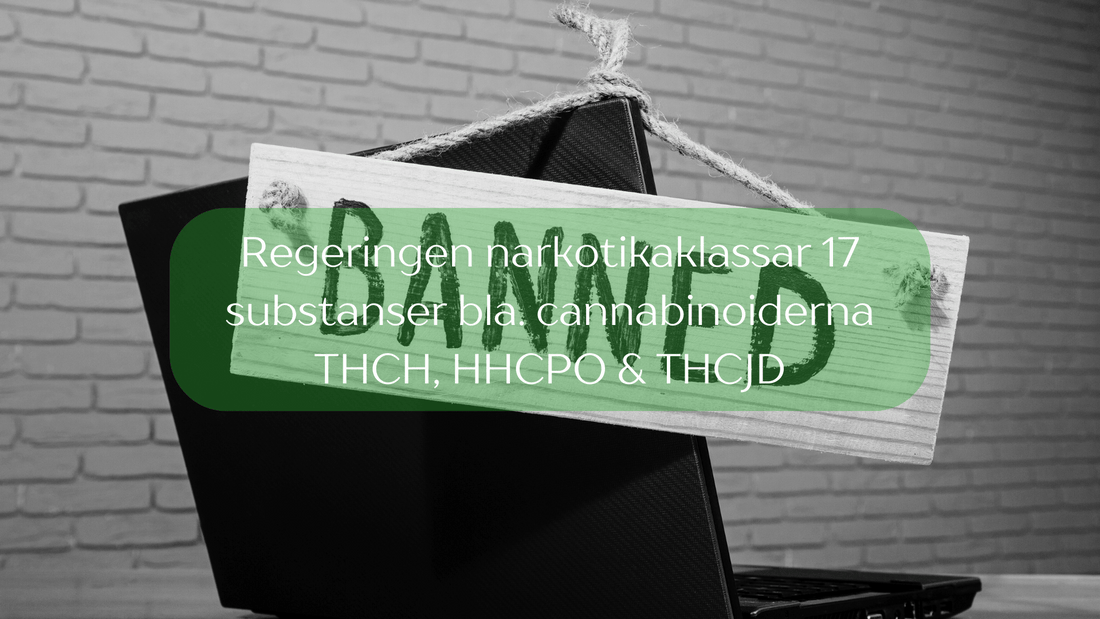
The government classifies 17 substances as drugs
Share
Following a proposal from the Public Health Agency, the government hasdecided to classify 17 substances as narcotics and classify a further three as health-hazardous goods. The decision is part of Sweden's work to limit access to new and potentially dangerous substances, including a range of synthetic opioids and cannabis-like substances. Here we go through what these substances are, why they are regulated and what this means for you.
What are the substances that are regulated?
Among the substances that are now classified as narcotics are a number of different substances with varying properties and areas of use. The Public Health Agency has divided them into two main groups:
- Synthetic Opioids: Nitazenes are a group of extremely potent synthetic opioids that can cause respiratory arrest and death at very small doses. In recent years, these substances have been linked to several deaths in Sweden and are therefore considered to pose a significant health risk.
- Cannabis-like substances: Including delta-8-THCH , delta-9-THCH, HHCP-acetate and several variants of THC-C8. These products have become widespread in online shops and kiosks and are often used as alternatives to regulated cannabis products.
In addition to this, three substances, including HHCH and delta-9-THCP acetate, have been classified as hazardous goods.
Why are these substances classified?
The Public Health Agency has highlighted several reasons why these substances are now regulated. For the Nitazens, it's about preventing potentially fatal consequences. These opioids have not only caused deaths in Sweden, but their extremely high potency means that even small amounts can be fatal.
The cannabis-like substances are primarily classified as a precautionary measure. Although these substances do not have the same documented risks as nitazenes, the Poisons Information Center has reported several cases where people needed care after using similar products. The regulation aims to reduce availability and avoid long-term health risks.
How does the decision affect you?
If you use or sell products that contain any of the substances that are now regulated, it is important to know that all handling of these substances will become illegal as of the decision's entry into force. The exact date is yet to be determined, but is expected to take place within 30-45 days.
If you have products at home that contain these substances, you should immediately:
- Stop using the products: After the regulation, it is illegal to possess them.
- Contact the municipality: They can provide guidance on how to safely dispose of these substances.
- Avoid littering: Do not throw the products in ordinary garbage or in unauthorized places.
Positive aspects of the decision
Although the regulation can be perceived as restrictive, it is important to understand that it aims to protect public health and reduce the risk of abuse and accidents. By limiting access to dangerous substances, we can prevent both acute and long-term health problems.
For the cannabis-like substances, such as THCH and HHCP acetate, it is positive that they are still used in other countries without major incidents. Their popularity shows that they are in demand and could potentially play a role in future, more regulated markets.
Who can answer questions about the regulation?
For questions about the decision and its implications, you can contact Simon Hoff, press secretary to Social Affairs Minister Jakob Forssmed.
- Telephone (exchange): 08-405 10 00
- Mobile: 076-127 76 97
Final thoughts
The regulation of these 17 substances is part of Sweden's strategy to protect public health and prevent dangerous substances from causing harm. At the same time, it is important to remember that substances such as THCH and HHCP acetate are still legal and used in many other countries, which shows that their risks vary according to use and context.
If you are affected by the decision, be sure to act in time to comply with the new rules. For more information, stay updated through official channels and contact relevant authorities as needed. This decision is an opportunity for Sweden to strengthen its regulation and reduce risks, while we continue to learn more about these substances and their effects.
